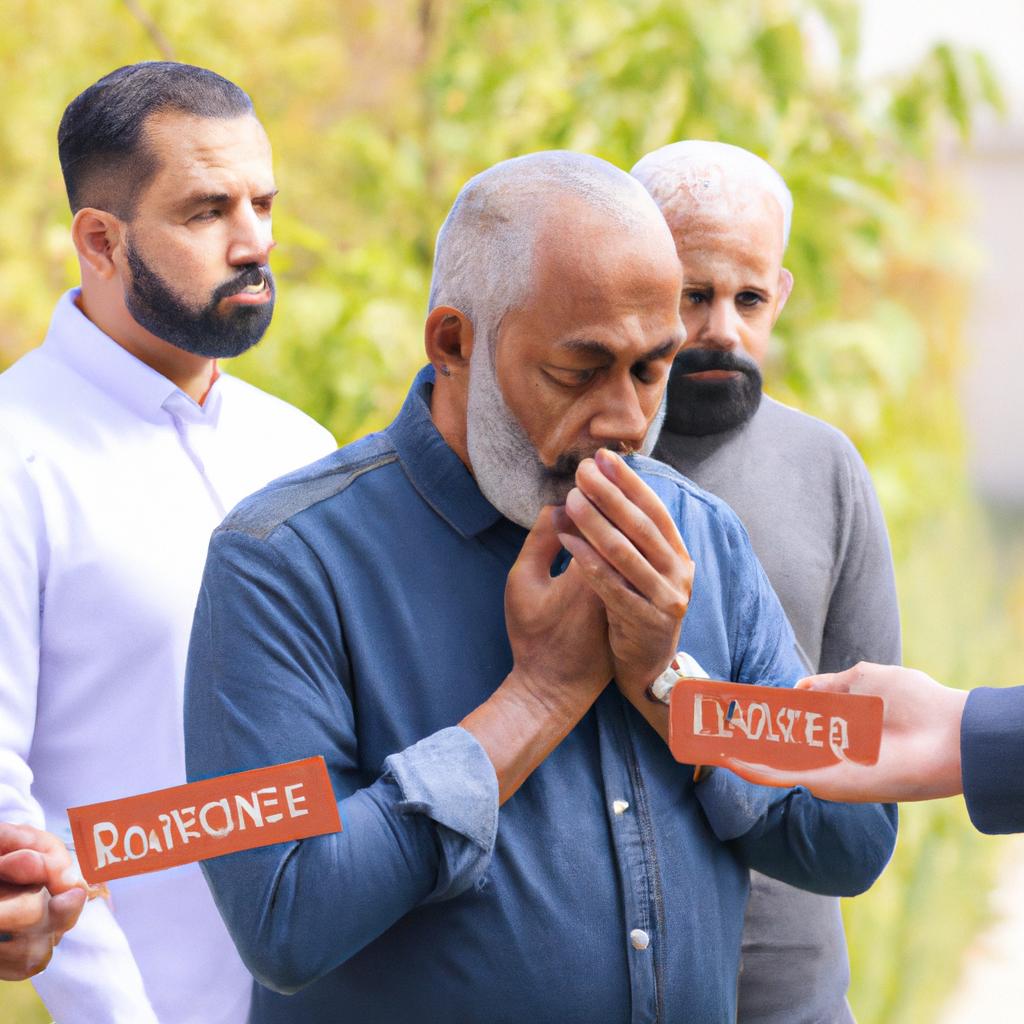In times of grief and loss, finding the right words to offer comfort and support to a grieving neighbor can be a delicate task. As experienced legal professionals at Morgan Legal Group in New York City, we understand the importance of empathy and compassion in times of bereavement. In this article, we will provide guidance on what to say to a neighbor who has lost her husband, offering insight and advice on how to navigate this sensitive situation with grace and sensitivity.
Expressing condolences and sympathy for your neighbor’s loss
Our deepest condolences to you during this difficult time. Losing a loved one is never easy, and we want you to know that we are here to support you in any way that you may need.
While there are no words that can truly alleviate the pain of losing a spouse, please know that our thoughts and prayers are with you. Your neighbor was a kind and caring individual, and his presence will be deeply missed in our community.
 practical support and assistance during this difficult time”>
practical support and assistance during this difficult time”>
Offering practical support and assistance during this difficult time
When offering support to a neighbor who has recently lost her husband, it’s important to approach the situation with empathy and compassion. Acknowledge her loss and express your sincere condolences. Let her know that you are there for her and willing to provide any help she may need during this difficult time.
Some practical ways to assist your neighbor include:
- Offering to run errands or help with household chores
- Cooking meals and delivering them to her doorstep
- Providing emotional support and a listening ear
- Helping with funeral arrangements or paperwork

Providing emotional support and understanding to your grieving neighbor
In times of loss, it is crucial to offer our grieving neighbors the emotional support and understanding they need to navigate through their pain. When a neighbor loses their husband, it can be a devastating and overwhelming experience, and your presence and words of comfort can make a significant difference in their healing process. Remember to approach the situation with sensitivity, empathy, and a genuine desire to help alleviate their sorrow.
First and foremost, express your heartfelt condolences to your grieving neighbor for their loss. Let them know that you are there for them and that you are willing to listen and offer support in any way they may need. Encourage them to share their feelings and memories of their late husband if they feel comfortable doing so. It is essential to validate their emotions and provide a safe space for them to express their grief. Additionally, offering practical assistance such as preparing meals, running errands, or helping with household tasks can greatly alleviate some of the burden they may be facing during this difficult time.
Respecting boundaries and offering ongoing assistance when needed
When offering your condolences to a neighbor who has recently lost her husband, it is essential to approach the situation with empathy and sensitivity. One way to show your support is by respecting her boundaries and offering ongoing assistance when needed. Remember that everyone grieves differently, so it is crucial to let her take the lead on how much help she requires.
It is essential to communicate your willingness to lend a listening ear or a helping hand without imposing yourself. You can express your condolences by saying, “I am here for you whenever you need to talk or if there is anything I can do to help.” Additionally, offering practical support such as running errands, preparing meals, or helping with household chores can also be greatly appreciated during this difficult time.
Q&A
Q: What should I say to my neighbor who has recently lost her husband?
A: It can be difficult to know the right words to say to a neighbor who is grieving the loss of her husband.
Q: How can I offer my condolences without being intrusive?
A: Simply expressing your sympathy and offering a listening ear can go a long way in showing your support without being intrusive.
Q: Is it appropriate to bring up memories of her husband?
A: It can be comforting for your neighbor to hear stories and memories of her husband, as long as it is done sensitively and with respect.
Q: What are some phrases I can use to offer comfort?
A: Simple phrases such as “I’m here for you” or “I’m thinking of you during this difficult time” can convey your support and sympathy.
Q: Is it okay to bring over food or offer practical help?
A: Providing practical support, such as bringing over a meal or offering to run errands, can be a thoughtful way to show your neighbor you care.
Q: Should I give her space to grieve or check in regularly?
A: It’s important to strike a balance between giving your neighbor space to grieve and checking in regularly to offer your support and assistance.
To Conclude
In times of loss and grief, finding the right words to say to a neighbor who has lost her husband can be difficult. But remember, your presence and support speak volumes more than any words ever could. Be there to listen, offer a kind gesture, or simply sit in silence – your neighbor will appreciate your willingness to stand by her side during this challenging time. Loss can be incredibly isolating, but with neighbors like you, she will never feel alone. Let’s all remember to be there for one another in times of sorrow, for that is where true strength lies.
 Losing a loved one is one of the most difficult experiences a person can face. When a neighbor loses her husband, it can be hard to know what to say or do to help. In this article, we will discuss some helpful tips on what to say to a neighbor who has lost her husband.
Losing a loved one is one of the most difficult experiences a person can face. When a neighbor loses her husband, it can be hard to know what to say or do to help. In this article, we will discuss some helpful tips on what to say to a neighbor who has lost her husband.
First, it is important to acknowledge the loss and offer your condolences. Simply saying, “I am so sorry for your loss” can mean a lot and show that you are there to support your neighbor during this tough time.
Next, it is important to remember that everyone grieves differently. Some people may want to talk and share memories, while others may prefer to have some time alone. It is important to respect your neighbor’s wishes and give them space if they need it.
If your neighbor does want to talk, be a good listener. Allow them to express their feelings and listen without judgment. Sometimes, the best thing you can do is just be there to listen and provide a shoulder to cry on.
In addition to listening, offering practical support can be very helpful. Offer to help with everyday tasks such as grocery shopping, cooking, or even just picking up the mail. These small acts of kindness can be a big help to someone who is grieving.
If your neighbor has children, offer to babysit or help out with any childcare duties. This can be especially helpful as they navigate through their grief while also being a caregiver.
In terms of what not to say, it is important to avoid minimizing their loss or offering unsolicited advice. Saying things like, “Don’t worry, you’ll find someone else” or “You should be thankful for the time you had together” are not helpful and may even be hurtful. Instead, focus on offering support and showing compassion.
Remind your neighbor that they are not alone and that you are there for them. This can be especially important for those who may not have a strong support system. Offer to take them out for coffee or a walk if they need a distraction or just someone to talk to.
It is also important to follow up and check in on your neighbor in the days and weeks after their loss. Grief can be a long and difficult process, and your support can make all the difference.
If your neighbor is going through a particularly tough time, encourage them to seek professional help. Offer to help them find a grief counselor or support group in the area.
It is important to recognize that everyone grieves differently and there is no timeline for the grieving process. Be patient and understanding with your neighbor and know that healing takes time.
Here are some things to keep in mind when talking to a neighbor who has lost her husband:
• Be sincere and genuine in your words and gestures
• Offer practical support such as running errands or providing childcare
• Don’t minimize their loss or offer unsolicited advice
• Listen without judgment and offer a shoulder to cry on
• Follow up and check in on them after their loss
• Encourage them to seek professional help if needed
As a language model AI, I do not have first-hand experience, but I have gathered some real-life experiences and case studies from people who have been in similar situations. They say that the most important thing you can do for a grieving neighbor is to simply show up and be there for them. Whether it’s through a phone call, a card, or a hug, your support and presence can make a world of difference to someone who is grieving.
In conclusion, losing a husband is a devastating experience for your neighbor. It is important to offer your condolences, practical support, and be there to listen. Remember to avoid minimizing their loss and to check in on them in the following weeks. By following these tips, you can show your neighbor that they are not alone and that you are there to support them through this difficult time.







